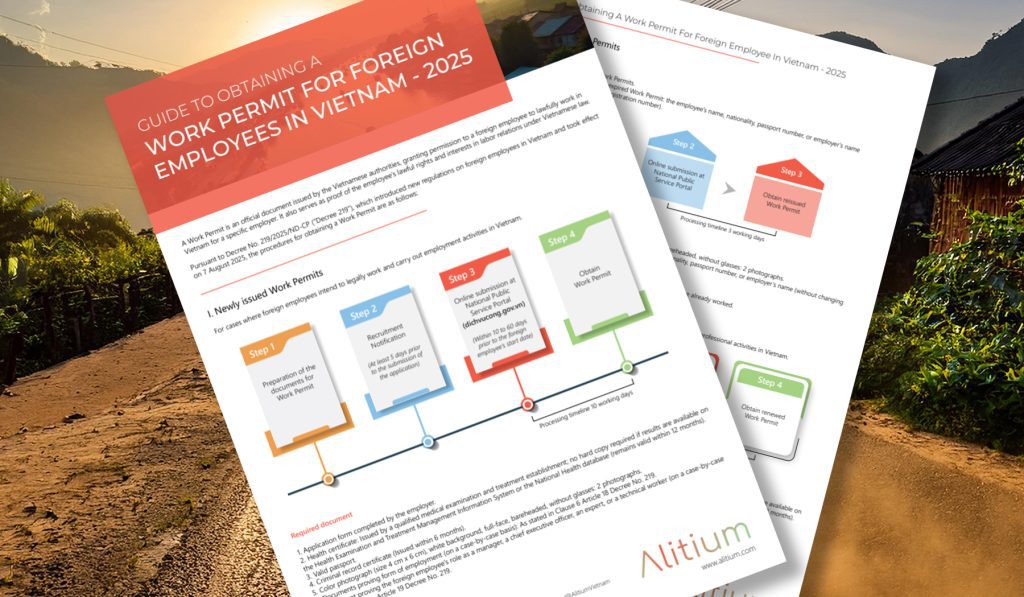Tax Incentives for Software Development in Vietnam
Vietnam continues to prioritize the development of its technology sector through offering significant tax incentives to encourage investment in domestic software production. These incentives, granted through Corporate Income Tax (CIT) reductions and exemptions, are primarily governed by Vietnam’s tax laws and specific regulations outlined in Circular 13/2020/TT-BTTTT (Circular 13) and Circular 01/2022/VBHN-BTTTT (Circular 01), both issued by the Ministry of Communications, which consolidate guidelines for the software industry. However, to take full advantage of these tax benefits, investors need to be aware of both the eligibility requirements and potential risks.
Click here to download this article as PDF: Software Tax Incentives October 2024
Available Tax Incentives & Benefits
Software production companies in Vietnam that meet eligibility criteria can access the following CIT incentives:
- CIT Exemption: Newly established companies (or new projects) in software production can enjoy a full exemption from CIT for the first four years. The exemption period begins from the first year the company earns taxable income, but no later than the fourth year of operations (ie, the fourth year will be the commencement of the exemption period, unless there is revenue earned in the earlier years).
- CIT Reduction: After the four-year exemption period, the company is entitled to a 50% reduction in CIT for the next nine years.
- Preferential CIT Rate: Eligible software production companies further receive a reduced CIT rate of 10% for up to 15 years. This preferential rate, lower than the standard 20% CIT, is an incentive to establish long-term operations in Vietnam.
Circular 13 and Circular 01 provide further guidance on specific in how the preferential rate is applied.
Overview and Eligibility of Tax Incentives for Software Production
Software production, as a priority industry for Vietnam, qualifies for tax incentives under Vietnam’s tax laws, and is supported by Circular 13 and Circular 01, which detail the technical standards, definitions, and requirements for software production. These incentives are designed to attract and retain both local and foreign investment for new software production projects.
The eligibility requirements are stringent, and involve both technical and operational conditions.
- Software Production Activities: The incentives are applicable only to companies engaged in the development, production, and maintenance of software. Circular 13 outlines the eligible activities, such as software development and system integration, and specifies that software development must include at least one of (i) requirement determination/classification or (ii) analysis and design specification. Circular 01 expands on these by clarifying additional technical definitions and criteria for what qualifies as software production. Companies that only distribute software, for example, are excluded from these benefits.
- Technical Standards Compliance: Both circulars provide specific guidelines for the technical standards that software must meet. These emphasize the required technical specifications such as the use of defined programming languages, the development process, and system architecture. Products are to undergo a technical review to ensure compliance with these standards.
- Submissions to the Ministry of Information and Communications (MIC): As part of the requirement for eligibility, companies must complete required submissions covering the software production process, produced software, and the deductible tax rates with MIC.
- Investment and Operating Requirements: New investors must ensure that their projects meet the specific technical thresholds, as outlined in both circulars. Furthermore, continuous software production operations is required to maintain eligibility. If a company ceases operations or fails to meet the operational standards, it risks losing its incentives.
Risks and Challenges
While the tax incentives for software production are beneficial, there are risks and challenges that foreign investors must navigate to ensure continued eligibility for the incentives. Key risks include:
- Technical Non-compliance: The technical standards laid out in Circulars 13 and Circular 01 are stringent. Companies that fail to comply with these technical criteria, or that do not submit required information to MIC, risk losing their tax incentives. Continuous compliance is essential, as failing to maintain technical standards over time can result in disqualification.
- Compliance with General Tax Laws: In addition to the requirements under the circulars, companies must comply with all general tax regulations, including transfer pricing rules for cross-border transactions. Improper documentation or transfer pricing issues could lead to penalties and the loss of tax incentives. Investors should seek to establish a culture and process for tax compliance to mitigate this risk.
- Operational Focus and Scope Creep: Companies must maintain a clear focus on software production. Engaging in activities outside the defined scope, such as software distribution or services unrelated to production, could result in disqualification from tax benefits. Both Circular 13 and Circular 01 emphasize that companies must stay within the technical and operational definitions outlined in these regulations.
Practical Considerations for Foreign Investors
Investors looking to establish software production operations in Vietnam should conduct careful planning and ensure compliance with both Circular 13 and Circular 01. Practical steps include:
- Pre-Investment Technical Assessment: Investors should conduct a thorough technical review of their software products/plans to ensure compliance with the requirements outlined in the circulars.
- Long-term Compliance Strategy: Given the long-term nature of the tax incentives, companies must establish ongoing compliance systems. This includes regular audits of both technical and tax compliance to ensure they continue to meet the criteria outlined in the circulars.
Vietnam offers substantial tax incentives for investors in software production, continuing to advance Vietnam as an attractive destination for new software ventures. The benefits can significantly reduce operational costs of software development and enhance profitability, if structured appropriately. However, the complexity of the eligibility requirements and the need for strict compliance with both technical standards and tax laws pose challenges that investors must carefully navigate. Foreign investors should prioritize their pre-investment due diligence and implement long-term compliance strategies to take full advantage of these tax incentives while mitigating potential risks.
Matthew Lourey is Chairman & Advisor at Alitium, with 20 years experience in Vietnam assisting foreign investors navigate and maintain compliance in market. Contact Matthew via Alitium.com for further assistance and advice.








